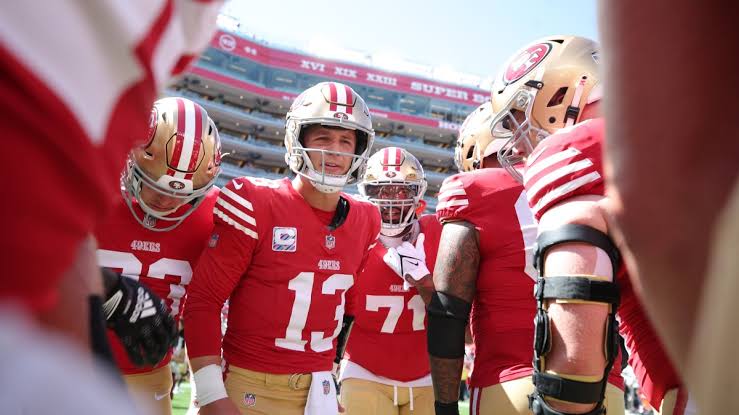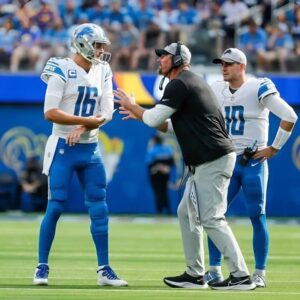
In the high-stakes world of professional sports, where athletes are often seen as larger-than-life figures, the intangible factors that contribute to success are often overlooked. Among these factors, gratitude stands out as a powerful force that can foster strong team chemistry, elevate morale, and inspire a collective drive to succeed. Brock Purdy, the quarterback of the San Francisco 49ers, has become an embodiment of this concept. From his unexpected rise to NFL stardom to the thoughtful ways he expresses appreciation for his teammates, Purdy’s approach to leadership is a testament to how gratitude can play a pivotal role in team dynamics.
The Importance of Team Chemistry
In any professional sport, chemistry among teammates can be the difference between success and failure. While individual talent is crucial, the ability to function as a cohesive unit often determines whether a team achieves its full potential. In football, the relationship between a quarterback and the offensive line, for example, is paramount. Without trust and mutual respect, it’s almost impossible to execute plays effectively. This dynamic extends beyond the field to locker room interactions, practice sessions, and even social engagements outside of football. When a player feels valued and appreciated, they are more likely to put forth maximum effort, both for their own success and for the benefit of their teammates.
### Brock Purdy’s Leadership Style
Brock Purdy’s leadership has quickly become a defining feature of his success with the 49ers. After stepping in as a starter due to injuries to more seasoned quarterbacks, Purdy demonstrated a rare poise and maturity, earning the respect of his teammates. But perhaps one of the most striking aspects of his leadership is the way he demonstrates gratitude to those who help him succeed. Purdy has a strong understanding of how the collective efforts of his teammates contribute to his success, and he has made it a priority to express his appreciation in meaningful ways.
Gratitude as a Catalyst for Team Unity
One of the most notable examples of Purdy’s gratitude was his approach to holiday gifts for his offensive linemen. In a season where Purdy had emerged as a key player in the 49ers’ offensive unit, he knew that his success would not be possible without the protection and hard work of his offensive line. Rather than opting for generic gifts, Purdy chose to go all-out in selecting personalized, thoughtful presents for each lineman. This gesture was more than just a holiday tradition; it was an act of recognition and appreciation for the sacrifices and hard work these players put in to ensure his safety on the field.
By acknowledging their role in his success, Purdy fostered an even deeper sense of camaraderie within the team. Each gift was a symbol of his recognition that football is a team sport, and no individual, no matter how talented, can succeed alone. This simple yet meaningful act of gratitude reinforced the bond between Purdy and his offensive linemen, creating a stronger, more unified team. The result was not only a better sense of team chemistry but also a heightened sense of responsibility and pride among the offensive line, which in turn led to even better performance on the field.
The Psychological Impact of Gratitude
Gratitude has been widely studied in psychology for its powerful effects on well-being, motivation, and social connection. When people feel appreciated, they are more likely to engage in positive behaviors, such as working harder, supporting others, and maintaining a positive attitude. In sports, where mental toughness and emotional resilience are essential, this sense of gratitude can be transformative.
For Purdy, expressing gratitude isn’t just about creating a feel-good atmosphere—it’s about building trust and reinforcing a culture of accountability. When players know that their contributions are valued, they are more likely to go above and beyond, not only for their own benefit but also for the good of their teammates. Gratitude, in this sense, is a powerful motivator, sparking a sense of ownership and commitment to the team’s goals.
Gratitude and Humility: A Winning Combination
Brock Purdy’s approach to gratitude is also deeply tied to his humility. Despite his meteoric rise to fame as a rookie quarterback, Purdy has consistently maintained an attitude of humility. He never seems to forget that his success is built on the efforts of others. This humility is a key element of his leadership style, and it sets the tone for the rest of the team.
In professional sports, where egos can sometimes overshadow the team dynamic, Purdy’s down-to-earth nature is a breath of fresh air. He regularly credits his teammates, coaches, and the entire 49ers organization for his success, emphasizing that it is the collective effort of the team that has allowed him to shine. This humility creates an environment where all players, regardless of their position or stature, feel equally valued.
The Ripple Effect: Gratitude Beyond the Locker Room
Purdy’s gratitude isn’t confined to the walls of the locker room or the field. His approach to leadership extends to his personal interactions with coaches, trainers, and even the 49ers’ support staff. Whether it’s a simple thank-you to a trainer for helping him recover from a minor injury or acknowledging the hard work of the coaching staff, Purdy understands that success is a team-wide effort, and that everyone plays a part in achieving greatness.
Moreover, Purdy’s example has likely influenced other players on the team. Gratitude, when modeled by a leader, can have a ripple effect throughout the entire organization. It creates a culture of appreciation that extends beyond the starting lineup and into every facet of the team. Players and staff members alike begin to understand that their contributions are valued, and they, too, are more likely to express gratitude in return.
The Long-Term Benefits of Gratitude in Team Building
While Purdy’s leadership style has already had an undeniable impact on the 49ers, the long-term benefits of fostering a culture of gratitude are even more significant. Teams that prioritize appreciation and mutual respect often enjoy more sustained success. When players feel appreciated and emotionally invested in the team, they are more likely to stay motivated through difficult seasons and persevere in the face of adversity.
In the case of the 49ers, Purdy’s gratitude-based leadership could be the foundation for long-term success. As he continues to grow and develop as both a player and a leader, his commitment to acknowledging the contributions of others will only strengthen the bonds between teammates. This strong, cohesive unit will be better equipped to handle the pressures of the NFL and sustain a high level of performance year after year.
Conclusion
Brock Purdy’s leadership style offers a powerful lesson on the importance of gratitude in building strong team chemistry. His thoughtful acts of appreciation, from holiday gifts to public acknowledgments of his teammates’ hard work, have helped create a positive, unified atmosphere within the San Francisco 49ers. In a sport that often prioritizes individual performance, Purdy’s example serves as a reminder that the key to long-term success lies in collaboration, mutual respect, and gratitude. By valuing his teammates and recognizing their contributions, Purdy has not only strengthened the bonds within the team but also created a winning culture that extends far beyond the football field.





